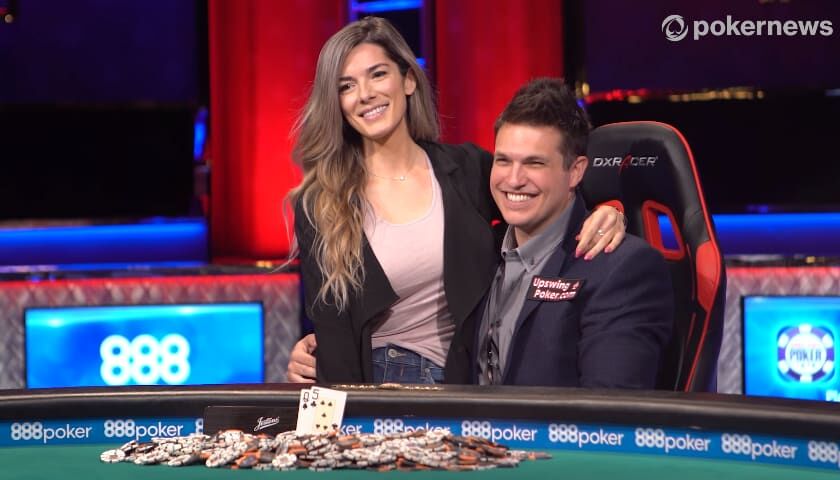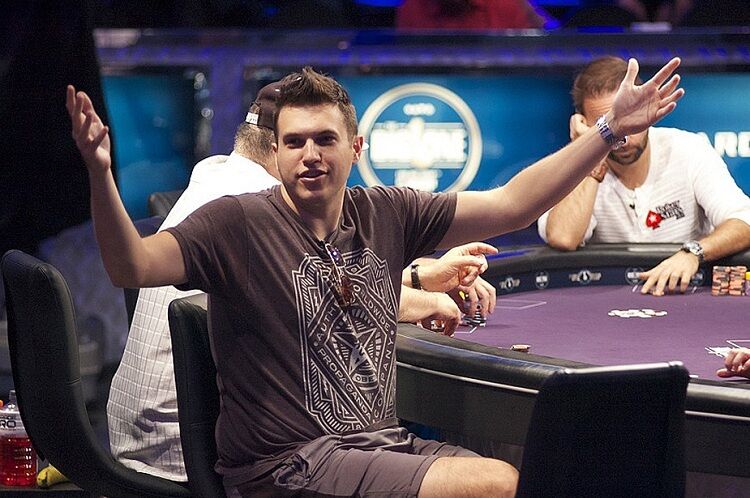The other day , Doug Polk got bored, and so he engaged in many hours of communication with Twitter subscribers:
– Ask anything about poker, I will answer right here.
One of the first questions was asked by Matt Glantz:
What is your funniest poker hand?
– I remember one. There was one hand in which both opponents “sold” their hand to other players so that they would play them out instead... I don’t remember the details.
– Is this allowed? – commenters were confused.
– It's too long to tell the whole story. But I assure you that the intentions of all the participants in this hypothetical hand were good.
The details of this strange hand were written by Matt:
F ( ed. – Frank Cassela ) opened 600 with , button called with , D ( ed. – Doug Polk ) on SB squeezed 2.400 s . F folded, but G asked to be allowed to play his cards. The whole table agreed. G said he folded preflop .
Flop with one heart, D bet 2k, G called.
Turn , D bet 6k, G called.
river , D checked, G shoved.
D fell into thought, at which point J asked for his cards and, having received them, made the call.
– Your worst hand?
– I don't even know where to start. Just recently played an impressive pot on stream with KhQh. I made a lot of misclicks online. But there aren't many hands that I really, really regret. Most of the pots that I have lost a lot in, I like my actions.
What is @DougPolkVids thinking???
— The Lodge Card Club (@LodgePokerClub) November 1, 2022
$20,000 pot and nobody has anything pic.twitter.com/XP0VaJqUJE
– Do you owe your success to a huge win online?
– The first 4 or even 5 million hands I played at full ring tables with a microscopic win rate. Such a number of hands were not in vain, and I learned the basics of poker well. However, if I had reduced the number of tables earlier and started playing short handed tables, the results would have been much better.
Is buying shares a good idea?
– No, in general terms. It is very important that you yourself know perfectly well the games in which you buy action in players. There are exceptions, but as a rule, just giving someone money for a game and wishing them good luck is not a good idea.
Take me, for example, in HU and MTT I always sold shares successfully, but in 6-max it ended in failure, because I myself am terrible in this format.
Is there a more miserable job than playing poker?
– Steve Nash has been looking pretty ridiculous at the Nets for the last couple of years.
How much money should be allocated for poker training?
– If you do not have a steady income outside of poker, it is advisable to start playing at the lowest limits. The game is not going anywhere, and it is much more important for you to learn the basics first.
What is good bankroll management?
– The main problem is that it is very individual. Some people say that you should move up in limits with 20 or 100 buy-ins, but this may not suit you personally. You'll have to find your own starting point. Consider your life situation (age, wife, children). It is also very important to be able to survive losses. There are situations when it is acceptable to take additional risk, and there are situations when, on the contrary, it is worth behaving calmer. Very often, the lack of a bankroll becomes the main deterrent for a good player. Therefore, a small move outside the comfort zone is quite acceptable, the main thing is not to lose control.
How much have you won in your entire career?
– It is very difficult to say for sure, I have been playing for a very long time. In the region of $15-20 million, and excluding shares, $10-12 million is my personal profit. But I'm not sure. Won less than others think.
Do you plan to play for the rest of your life? If not, what options are you considering?
– I was ready to finally say goodbye to poker, but I realized that it was stupid, considering what opportunities there are. I do not want to guess and limit myself to some kind of framework. I am sure that I could make money on YouTube or in business.
How to start learning poker to beat the micro limits?
– I didn't plan on putting up any ads, but there is one tutorial site where you can find a lot of materials available for beginners. Or you can just buy a solver and try to figure out its calculations yourself. It is very important to analyze your hands.
Is it true that T5o are the new aces? All straights and two flushes are blocked!
– No.
During the battle against Negreanu, you worked a lot on theory. Can you remember some aspects where you were weak, although you did not realise this before the solvers? And vice versa.
– Before the solvers, I didn’t understand what to do on flush boards at all. The common thread used to be that you should always bet big to protect your equity. But in reality, both players are quite polarized in this situation, so small sizings work better on flush boards.
But I was head and shoulders above the field in overbets, I played like that all the time. Solver also advises this technique in a variety of situations. Especially against a capped range of opponents.
Who will win in a fight – Tony G or 19 hungry swans?
Depends on how hungry Tony is.
What are the prospects for poker in 5 years, given the development of solvers and bots?
– The worst prospects are for online cash. Hints will become too accessible. But online MTTs, it seems to me, will always be popular.
Is there some condition that everyone seems to think to be mandatory for a successful poker career, but in fact is complete nonsense?
– Meditation.
I'm just starting my poker career and I work out a lot. I'm wondering if online is still suitable for making money or the level of play has grown too much there?
– Online is a great training ground where you can hone your skills. But all the money is now live.

When did you realize that you could make money playing poker?
– In the first year of my career. But this confidence was foolish. Everything worked out for me, but with equal probability, everything could go in a completely different direction.
In what situations is it right to slowplay strong hands?
– As elsewhere, a balance is needed here, otherwise you will be easily read. Here are a few key factors:
1. You have a very weak range / Villain has a strong range.
2. You are blocking good hands that you want to call.
3. Static boards.
For example, you called a 4-bet with kings and hit a K72 rainbow flop. It's almost always better to trap here.
And if you called a 3-bet with , then on the board it's almost always better to raise, but with it's better to trap.
What bankroll did you start with?
– $20.
How many winning players are there in poker?
– Very few. It is difficult to say for sure, I will assume that it's around 1% to 10%.
On any board, I immediately look for hands that beat me. How to get rid of this problem?
You will never be successful with this approach. There are special programs in which you can load ranges and get the probability of a particular hand from an opponent. I would start with this to get rid of excessive suspicion.
I noticed that professional players very often transfer EV and probabilities to life situations. Why is this happening?
– Because there are possibilities in life too. But if all of your decisions are passed through the internal EV calculator, you can lose your soul. In the quest for an optimal life, remember to enjoy the little things.
Is it possible to win without GTO?
– Of course. In weak lineups, when you have great reads on your opponents, you will print money by playing any way you like. However, in complex lineups, everything will change quickly.
Why do I always get it in good, but always lose?
– Just bad luck.

I played tournaments for a year with a small profit, I want to move to the cash. What do you recommend?
– You will have to play noticeably tighter, because there are no antes. But preflop hands should be chosen for playability, not pure strength. Suited connectors have good value, but stay away from bad offsuit aces.
What is the best way to start your professional career?
– I would try to play a little poker.
Doug ended the conversation with the audience with "best poker advice":
– Focus on good balanced poker. All this "GTO vs. Exploit" debate is bullshit. To begin with, you need a strong base, this is what all your training should be aimed at. And only then you can make adjustments for specific opponents.
“Doug, but you don’t know anything about my opponents, they always limp, and then they call everything and see the flop with seven of them...”
I spun from $20, then ran a marathon from $100 to $10k, and this year I played a lot of mid stakes in Texas. I have a great idea of what games are like. All this doesn't matter.











